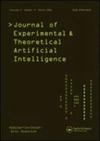Correlation-based Oversampling aided Cost Sensitive Ensemble learning technique for Treatment of Class Imbalance
IF 1.7
4区 计算机科学
Q3 COMPUTER SCIENCE, ARTIFICIAL INTELLIGENCE
Journal of Experimental & Theoretical Artificial Intelligence
Pub Date : 2021-01-13
DOI:10.1080/0952813X.2020.1864783
引用次数: 5
Abstract
ABSTRACT The issue of class imbalance and its consequences over the conventional learning models is a well-investigated topic, as it highly influences performances of real-life classification tasks. Amongst the available solutions, Synthetic Minority Oversampling Technique (SMOTE) imprints efficacy in balancing the data through synthetic minority instance generation. However, SMOTE suffers from the drawback of redundant data generation owing to uniform oversampling rate in regard to which, SMOTE with a customised oversampling rate has been investigated recently. In parallel to this, ensemble learning approaches are quite effective in improving prediction abilities of a set of weak classifiers through adaptive-weighted training. However, it does not account the imbalanced nature of the data during training. Through this paper, Correlation-based Oversampling aided Cost Sensitive Ensemble learning (CorrOV-CSEn) is proposed by integrating correlation-based oversampling with the AdaBoost ensemble learning model. The correlation-based oversampling entails to define a customised oversampling rate and a suitable oversampling zone while a misclassification ratio-based cost-function is introduced in the AdaBoost model to administer adaptive learning of imbalanced cases. CorrOV-CSEn is evaluated against 13 state-of-the-art methods by using 8 simulation datasets. The experimental results establish CorrOV-CSEn to be effective than the state-of-the-art methods in resolving the concerned issues.基于相关的过采样辅助代价敏感集成学习技术处理类不平衡
类失衡问题及其对传统学习模型的影响是一个被广泛研究的话题,因为它高度影响现实生活中分类任务的表现。在可用的解决方案中,合成少数派过采样技术(SMOTE)通过合成少数派实例生成来实现数据平衡的有效性。然而,由于均匀过采样率,SMOTE存在冗余数据生成的缺点,对此,最近对具有定制过采样率的SMOTE进行了研究。与此同时,集成学习方法通过自适应加权训练在提高一组弱分类器的预测能力方面非常有效。然而,它没有考虑到训练过程中数据的不平衡性。本文通过将基于关联的过采样与AdaBoost集成学习模型相结合,提出了基于关联的过采样辅助成本敏感集成学习(corv - csen)方法。基于相关性的过采样需要定义一个定制的过采样率和一个合适的过采样区域,而在AdaBoost模型中引入了一个基于错误分类比率的成本函数来管理不平衡情况的自适应学习。通过使用8个模拟数据集,对13种最先进的方法进行了腐蚀- csen评估。实验结果表明,在解决相关问题方面,腐蚀- csen比现有的方法更有效。
本文章由计算机程序翻译,如有差异,请以英文原文为准。
求助全文
约1分钟内获得全文
求助全文
来源期刊
CiteScore
6.10
自引率
4.50%
发文量
89
审稿时长
>12 weeks
期刊介绍:
Journal of Experimental & Theoretical Artificial Intelligence (JETAI) is a world leading journal dedicated to publishing high quality, rigorously reviewed, original papers in artificial intelligence (AI) research.
The journal features work in all subfields of AI research and accepts both theoretical and applied research. Topics covered include, but are not limited to, the following:
• cognitive science
• games
• learning
• knowledge representation
• memory and neural system modelling
• perception
• problem-solving

 求助内容:
求助内容: 应助结果提醒方式:
应助结果提醒方式:


